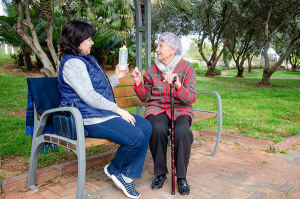5 Things That Can Worsen Alzheimer’s Symptoms

Alzheimer’s symptoms can be exacerbated by a number of triggers.
While there are particular commonalities, Alzheimer’s disease affects each individual uniquely. Our highly trained dementia caregivers know, for instance, that even though one individual may appreciate being outdoors, someone else may be overwhelmed by so much sensory input and prefer a tranquil indoor environment. One person may enjoy a morning bath routine, while a dose of creativity is essential to help another manage good hygiene.
We also recognize there are particular triggers that can often worsen Alzheimer’s symptoms. Family members should be particularly mindful to avoid the following:
- Dehydration. People who have dementia may not be in a position to identify when they’re thirsty, or may reject offered fluids. It is important to ensure proper hydration to stop added weakness and confusion. Plain water is the best; but if that is not welcomed, try flavored waters, in addition to various kinds of cups or bottles.
- Isolation. People who have dementia suffer from loneliness as much as anyone else, and without having adequate social stimulation, could become increasingly agitated or paranoid. Professional in home care services in Newport Beach and surrounding areas, like those offered by CareWorks Health Services, can offer appropriate socialization, giving family members a much-needed break from care.
- Sugar. It is not unusual for many with Alzheimer’s disease to have a heightened desire for cookies, cake, and other sugary snacks; however, it can also produce additional irritability. Try offering a variety of healthier options, like fruit, yogurt, or sugar-free goodies.
- Sleeping pills. With the challenges of common sleep issues such as sundowning, it can be tempting for family members to offer sleeping pills to a senior with Alzheimer’s to promote a more restful night. Yet these pills increase the risk for falls and other injuries and add to confusion and fogginess. Talk with the senior’s doctor for an all-natural sleep-inducing alternative.
- TV. Be aware of what is on TV; shows that contain criminal activity, violence, and even the nightly news can instill fear and paranoia in those with dementia. It might be better to leave the TV off and engage your loved one in alternative activities, such as games, puzzles, reading together, exercising, and reminiscing – or choose to view videos you have carefully reviewed to make certain that the content is appropriate.
Every member of the CareWorks Health Services dementia caregiving team is highly trained and experienced in providing person-centered, thoughtful care to successfully manage the difficulties inherent with Alzheimer’s disease, and to maximize quality of life. Contact us or call (949) 859-4700 for further dementia care tips, or for an in-home consultation to discover how our specialized in home care in Newport Beach and surrounding areas can make life better for your senior loved one.
